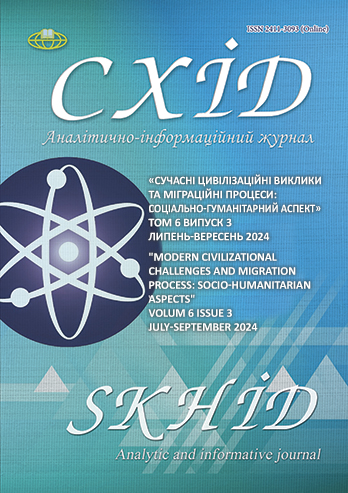Modern life experience of Ukrainian migrants in the context of intercultural strategies
DOI:
https://doi.org/10.21847/2411-3093.633Keywords:
migrants, intercultural communication, cultural adaptation, intercultural strategies, liminality, integrationAbstract
The article reveals the current aspects of the problem of intercultural relations, adaptation and integration of Ukrainian refugees in a new social and cultural envi-ronment. The stages of acculturation of migrants are systematized using the classic works of K. Oberg, J. Berry and modern sociological research. It was found that the processes of assimilation of values, forms of behavior of a new community, crea-tion of new cultural algorithms contribute to the separation of a person from the traumatic experience of the past and overcoming post-traumatic cultural stress.
An important component of adaptation processes of migrants is the support of their host state and civil society. The need to work with migrants is emphasized, in particular, work with injuries caused by the military conflict, strategies to counter violence caused by the consequences of war, work to achieve dialogue and peace-ful resolution of conflicts, countering discrimination, integration of refugees into the everyday and cultural space of the local community, assistance in the development of social entrepreneurship to resolve socio-economic conflicts.
Downloads
References
Attitudes towards Ukrainian refugees and governmental responses in 8 European countries. Forum on the EU Temporary Protection Responses to the Ukraine War (2022). ASILE. Retrieved from https://www.-asileproject.eu/attitudes-towards-ukrainian-refugees-and-governmental-responses-in-8-european-countries/.
Berry, J. (2007). Acculturation strategies and adaptation. In: J. E. Lansford, K. Deater-Deckard, & M. H. Bornstein (Eds.) Immigrant families in contemporary society. The Guilford Press. pp. 69–82.
Botelho, V. (2022). The impact of the influx of Ukrainian refugees on the euro area labour force. Platform: European Central Bank. Retrieved from https://www.ecb.europa.eu/pub/economic-bulletin/focus/2022/html/ecb.ebbox202204_03~c9ddc08308.en.html.
Horbunova, L. (2017). Selfhood in the Space of Liminality: Towards the Justification of Transformative Strategies in Higher Education. Philosophy of Education, 2 (21), p. 71-97.
Hybrid War: in verbo et in praxi (2017): Vinnytsia, Nilan-Ltd (In Ukrainian).
Kolinko, M. (2017). Transgression of Everyday Life: The Experience of Resettlement in the Conditions of Hybrid Warfare in Donbas. In: Hybrid War: in verbo et in praxi. Vinnytsia, Nilan-Ltd, pp. 363–379 (In Ukrain-ian).
Kolinko, M. (2019a). Intercultural Communication: from Distinction to Inclusion. In: Intercultural Сommunication 6 (1), pp. 189–212. https://doi.org/10.¬13166/inco/102840.
Kolinko, M. (2019b). Intercultural Communication: A Topological Dimension. Vinnytsia, LLC Tvory (In Ukrainian).
Kolinko, M. (2019c): Nomadism as a way of being of the immigrants and internally displaced persons. EU-REKA: Social and Humanities, 2, pp. 56–62.
Naslidky mihratsiynykh protsesiv: novi vyklyky ta mozhlyvosti dlya rehioniv (2015). Lviv: National Academy of Sciences of Ukraine, State University "Institute of Regional Studies named after M.I. Dolishnyi" (In Ukrainian).
Oberg, K. (1960). Cultural shock: Adjustment to New Cultural Environments (Reprint). Practical Anthropol-ogy, 7 (4), pp. 142–146. https://doi.org/10.1177/-009182966000700405
Ward, C.; Bochner, St.; Furnham, A. (2005). The Psychology of Culture Shock. Philadelphia, Taylor & Francis e-Library.
Downloads
Published
How to Cite
Issue
Section
License
Copyright (c) 2024 Марина Колінько, Олена Александрова

This work is licensed under a Creative Commons Attribution-NonCommercial-NoDerivatives 4.0 International License.
1. Authors bear responsibility for the accuracy of facts, quotations, numbers and names used.
2. Manuscripts are not sent back.
3. The publisher does not always agree with the authors' opinion.
4. The authors reserve the right to authorship of the work and pass the first publication right of this work to the journal under the terms of a Creative Commons Attribution-NonCommercial-NoDerivatives 4.0 International License. This license allows others to distribute (copy) the published work for non-commercial purposes, provided there is mandatory attribution to its authors and a link to the first publication in our journal.
5. The authors have the right to conclude separate supplement agreements that relate to non-exclusive work distribution in the form in which it has been published by the journal (for example, to upload the work to the online storage of the journal or publish it as part of a monograph), provided that the reference to the first publication of the work in this journal is included.

